Stardew Valley guide: essential tips for mastering the farm
Our guide to Stardew Valley will help you farm smarter and make more money.
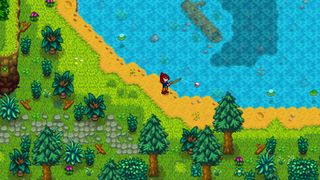
Starting Stardew Valley for the first time can be just a bit daunting. Even though the cozy farm simulation does its best to be laid back, there's a lot to do. When you first arrive at your inherited farm you've got a lot of things to keep you busy and only so much time in the day to do them.
Should you go introduce yourself to all the villagers first or start clearing some trees and debris to make room for your first 15 parsnips? After that, you'll still be weighing time between tons of tasks that all sap your precious energy. Should you spend time planting crops, catching fish, fighting monsters in the mines, or befriending the locals? It can be a tad bit overwhelming, which is why our Stardew Valley guide is full of tips to help get you running.
Here's what you should know before starting Stardew Valley, including what to do your first year and how to prioritize your spending.
If this isn't your first time on the farm, we've also got tips to help you decide what to do in Stardew Valley's endgame.
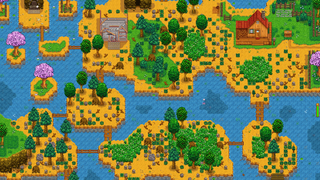
Choose your farm type wisely
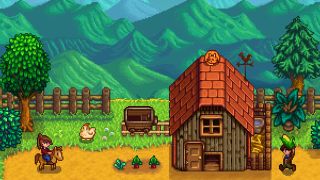
Stardew Valley mods: Custom farming
Stardew Valley co-op: Farm with friends
Games like Stardew Valley: More life sims
Best indie games: Our mixtape to you
In the 1.1 update, Stardew Valley had several new farm maps added. You can still choose the original, wide open field map from the game’s launch, but the others add support for those who may prefer fishing or fighting over farming. If you’ll be playing for the first time, the standard farm is a good, balanced option to help you figure out what pastimes are your favorite route through the game.
The riverland farm, as you might expect, is largely water. This cuts back on the farmable land but lets you catch all the river and lake fish that you otherwise would have to walk to town to lure in. Don’t forget the crab pots, either!
The forest farm provides foraging opportunities and respawning stumps for collecting hardwood. The hilltop farm adds a mining area, which is more convenient than going to the quarry. The wilderness farm spawns monsters at night, providing access to loot in your backyard, instead of trekking to the mines.
PC Gamer Newsletter
Sign up to get the best content of the week, and great gaming deals, as picked by the editors.
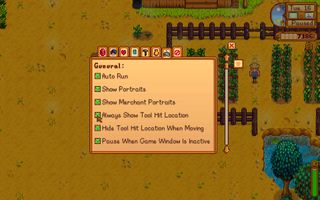
Activate "Always Show Tool Hit Location" immediately
I really like Stardew Valley, but the controls were incredibly confusing for me at first. It felt like I wasn't always watering/chopping/hoeing the square I was aiming at, and I couldn't figure out why. Then I discovered the "Always Show Tool Hit Location" option in the settings menu, which shows a red outline around the tile you are targeting, and immediately understood what was happening. If your mouse is pointed at one of the eight squares adjacent to your character, that's where you'll hit. But if it's farther away in any direction, you'll hit the square directly in front of the direction your character is facing.
It doesn't behave as you'd expect if you are used to playing twin-stick shooters or Terraria, which follows your mouse more accurately. Initially I assumed that if my mouse was in the top-left corner of the screen, I would be aiming at the top-left block adjacent to my character. Activating "Always Show Tool Hit Location" was pretty much the only way I could tell where I was going wrong, and it goes a long way in teaching you how to more accurately control your farmer.
You probably won't need the feature once you get comfortable with the controls, but it's vital at the game's start. And who knows, maybe developer ConcernedApe will change it to be on by default, the same way he did with auto run.
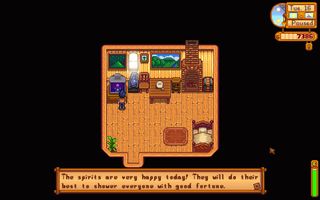
Watch TV every morning
It's easy to pass right by your TV in the mornings, but it's worth clicking through the various channels each time you wake up, especially since the game pauses while you read. The Weather Forecast is straightforward, telling you what you can expect for the next day. While it's not immediately useful information, it can potentially change what you might want to do that day if you know it will be raining the next.
The Fortune Teller is another one that can seem unimportant, but can genuinely shape what you plan for the day is. How "lucky" the Fortune Teller says your day will be directly influences certain RNG events within the game. Two important ones for that are item quality and ore in the mines. Picking crops or doing similar activities on lucky days increases the likelihood of those items being higher quality, thus selling for more.
And finally the irregular shows, Queen of Sauce and Livin' Off The Land, can be incredibly important. Queen of Sauce will teach you a new cooking recipe once a week, which becomes more relevant once you have a kitchen to cook in. On the other hand, Livin' Off The Land has immediately relevant information, telling you things you would otherwise only be able to learn from the game's official wiki page—like which fish are only available to catch during a season and the location and time of day then can be found.
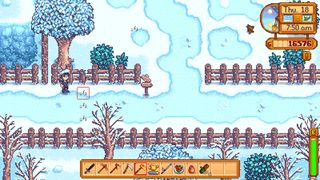
Look out for worms
If you’ve got keen eyes, you may have already noticed the occasional wiggling lines sticking out of the dirt—and if you haven’t seen them yet then make sure to keep your eyes peeled, because these worms aren’t just decoration. If you hit them with your hoe, you’ll dig up an item. This is the only way to find the lost books from the library, which can fill you in with hints and secrets when read. Apart from books, you can dig up artifacts for the museum and occasionally (if you’re unlucky) plain ol’ mud.
Don’t be surprised if you don’t see them as often or abundantly as in the picture above—in fact, that screenshot is definitely the exception rather than the rule. But be on the lookout for movement among the dirt and you’ll start seeing worms more often than you would have guessed. They seem to be more common when it’s raining and potentially on lucky days, so make sure to follow the tip above and always watch TV in the morning!
This tip didn’t make it into the first version of this list, but was hotly suggested in the comments below. Thanks everyone!
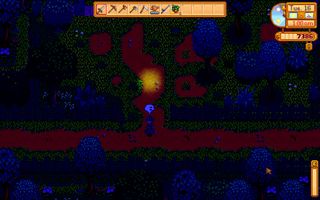
Go to bed
Let's just say I learned this the hard way so you don't have to. Staying up past 1 AM isn't much of a problem as long as you don't run entirely out of energy, but you will wake up with slightly less energy the next day. But once the clock strikes 2 AM, your Cinderella dress fades away as you hit the dirt and pass out on the ground, which is a whole lot worse than just going to sleep tired.
You'll have less energy the next day and be charged for a percentage of your total gold for the expense of whoever dragged you home that night. Additionally, and I may be crazy and wrong about this as I couldn't find anyone else who mentioned it, but I'm pretty sure I once lost a whole day after passing out in the woods. Either way, it's not worth the risk. It's good to push your usable hours to the max, but make sure you can still get home in time for a real bed each night.
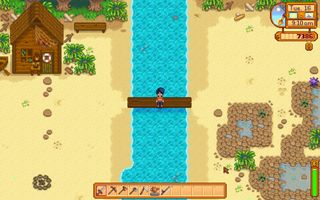
Fix the bridge to the tide pools early
From the very start of the game, there's a broken plank across the river on the right side of the beach that requires 300 wood to fix. Now, 300 wood is a whole lot, especially early in the game when it may take you a full day or two of chopping trees to get that amount, but it's definitely worth it in the long run. Repairing the bridge gives you access to the tide pools, a small extension to the beach area without much to do. What it does have, however, is Sea Urchins and Coral lying on the ground.
Sea Urchins and Coral, along with a few other things that occasionally show up, can be foraged from this area practically daily and sell for a surprising amount—which can make for an extremely helpful boost of gold in the early game. You make money slowly for your first few seasons, and the tide pools area offers a reliable (and, once opened, free) source of income. You won't miss the wood next season, and you will be thankful for the extra cash.
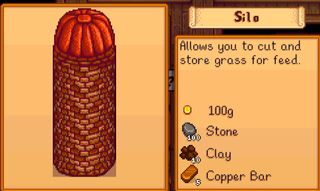
Build a silo before cutting your grass
Your farm is in a pretty sorry state at the start of the game, but resist the urge to immediately clear out the entire thing—at least hold off cutting the grass. When you chop down grass with the Scythe, it automatically collects as Hay, which is useful should you plan on raising any animals. The thing is, you only get Hay if you have a Silo in which to collect that straw.
A Silo is pretty easy to build. The nominal cost of 100g, 100 stone, 10 clay, and five copper bars isn't too difficult to come by, even in the early game. Build one before cutting all that grass and you should be plenty stocked for the coming winter.
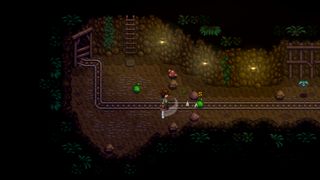
Bring food into the mines
Food is easy to underestimate when you first start Stardew Valley, primarily because you don’t have a kitchen and raw food just isn’t that impressive. But the ability to regenerate energy and health can be vital, especially when you’re trying to get the most out of each trip into the mines. Some of the community bundles can let you jump ahead a bit by giving you small quantities of high-end foods like chocolate cake, but even just crafting a handful of field snacks (unlocked from getting level one in foraging) can make the difference between passing out breaking rocks and making it to the next elevator.
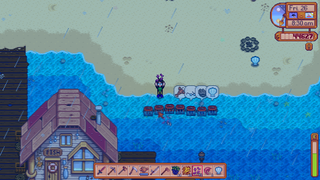
Crab pots are totally worth it

Stardew Valley mods: the best agricultural tweaks
Stardew Valley multiplayer: farm with friends
Stardew Valley tips: become a farming master
Stardew valley endgame: what to do
Stardew Valley Sebastian: schedule, gifts, and heart events
Stardew Valley Leah: schedule, gifts, and heart events
The crab pot is an item where you place it into a body of water (most profitably, the ocean), equip it with bait, and the next day you can return to collect your cretaceous catch. They definitely aren’t an early-game item as you have to have level three fishing to craft or buy them, and they are either take three iron bars to craft or 1,500 gold to buy. Definitely not cheap, but they have the potential for a massive return on your investment. They never break or run out, and as long as you keep them baited (which isn’t difficult if you are getting lots of bug meat from the mines) crab pots represent a nearly daily source of endless income.
What’s more, simply using a crab pot will let you complete the crab pot bundle in the community center, which (slight spoilers) will earn you three more crab pots. It’s definitely slow-goings at first, but if you aren’t a fan of fishing you can speed the process up by taking the Trapper profession at fishing level five, which changes the recipe of a crab pot from 40 wood and three iron bars, to 25 wood and two copper bars—a significantly lower cost to pay. Basically, crab pots start out looking expensive and slow, but if properly maintained are essentially an infinite source of free money. Nice, right?
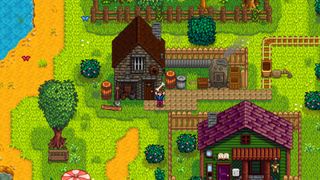
Upgrade your watering can strategically
It’s a natural impulse to want to upgrade your tools as soon as you can, and the watering can should be high on the list of which to upgrade first. You’ll quickly realize that the more your farm grows, the more time and energy you are spending on simply watering every morning—and sprinklers are slow to get. Upgrading your watering can will save you precious energy, as it allows you to hold down the left mouse button and water multiple squares at once.
However, like all tools, upgrading it takes two days, meaning you’ll have one full day without the ability to water your plants. Luckily the sky can do that for you. Watch the weather report everyday (do you believe that watching TV is important yet?) and wait until the forecast for the next day is rain. Then you can water your plants in the morning, give your watering can to Clint to be upgraded, let the rain water your crops the next day, and finally pick up your watering can at 9am the day after. This way your crops won’t miss a single watering.
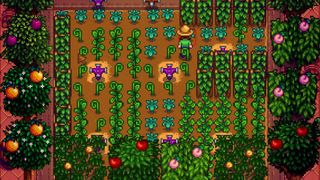
Build the greenhouse before your first winter
It can be easy to let the first spring pass you by without digging into the Community Center upgrades. If so, you could miss out on getting the greenhouse during your first year. While there are other activities during the winter, like digging up worms to find a concerning number of missing library books or delving deep into the mines, having the greenhouse available keeps the gold flowing during an otherwise fruitless season.
For the necessary pantry bundles, you will need one of several crops from each season along with five gold star rated crops in each season. Don’t let spring and summer turn into autumn without staying on track and stocking up on fertilizer to improve crop quality. You’ll also need some animal and artisan products, so keep an eye on upgrading your coop or barn as needed.
As an additional tip, make sure to invest in seeds like blueberries, cranberries, and tomatoes that all bear fruit continuously without being replanted. Paired with several sprinklers, you can go explore the mines every day of the winter without wasting your energy watering and planting crops.
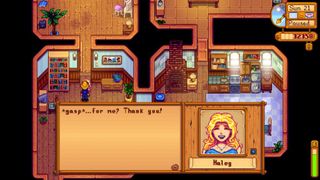
Don't forget birthdays!
Talking to villagers at least once a day will slowly increase their friendship with you, as will giving gifts they like. The fastest way to their hearts, literally, is by giving a gift on their birthday. Make sure to check the calendar hanging outside Pierre’s store (or buy your own) so you don’t miss one. As of the 1.1 update, all NPCs now appreciate the quality of gifts you give them, so long as it’s something they "like" or "love." Each quality level adds a multiplier to the friendship points you receive, along with the 8x bonus you already get for it being a birthday gift. It’s not just the thought that counts, so make sure to give Gold and Iridium star items as presents if you can!
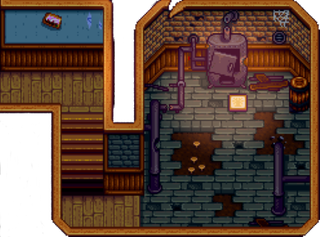
Feel the need for speed
Later in the game, you’ll have amassed an exhaustive list of chores each day. Even if you’ve automated your farm with sprinklers, you may find yourself heading to the desert mines, passing out gifts to villagers, or any other number of other tasks. There are several ways to get around the valley faster that you’ll want to unlock so you don’t waste the day just walking around.
The mine cart system which is initially busted can be repaired by completing the boiler room bundles with loot and ores from the mines. It will take you instantly to several key locations around town. A horse is also faster than hoofing it yourself, though getting the 100 hardwood needed for a stable can take some time for anyone not living on the forest farm map. As a final pick-me-up, coffee increases your speed for about a minute and a half, including your horse’s speed. You can buy coffee for 300g at the Saloon, but growing it yourself is the better option. You can find coffee beans as a random selection at the traveling cart. Turn the beans into a cup o’ joe by putting them in a keg and then sell whatever you don’t drink for profit.
Some images via the Stardew Valley wiki.
Most Popular


